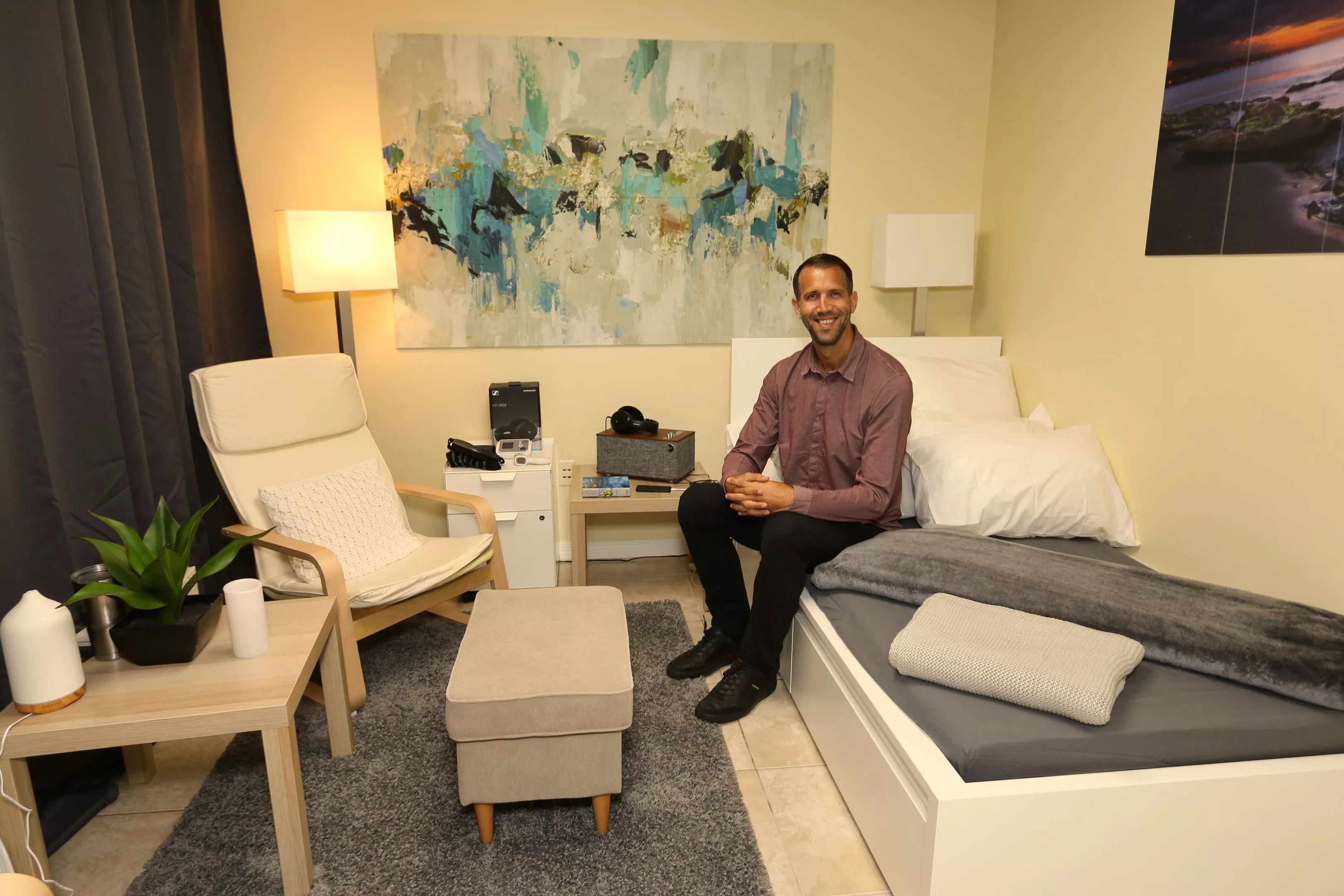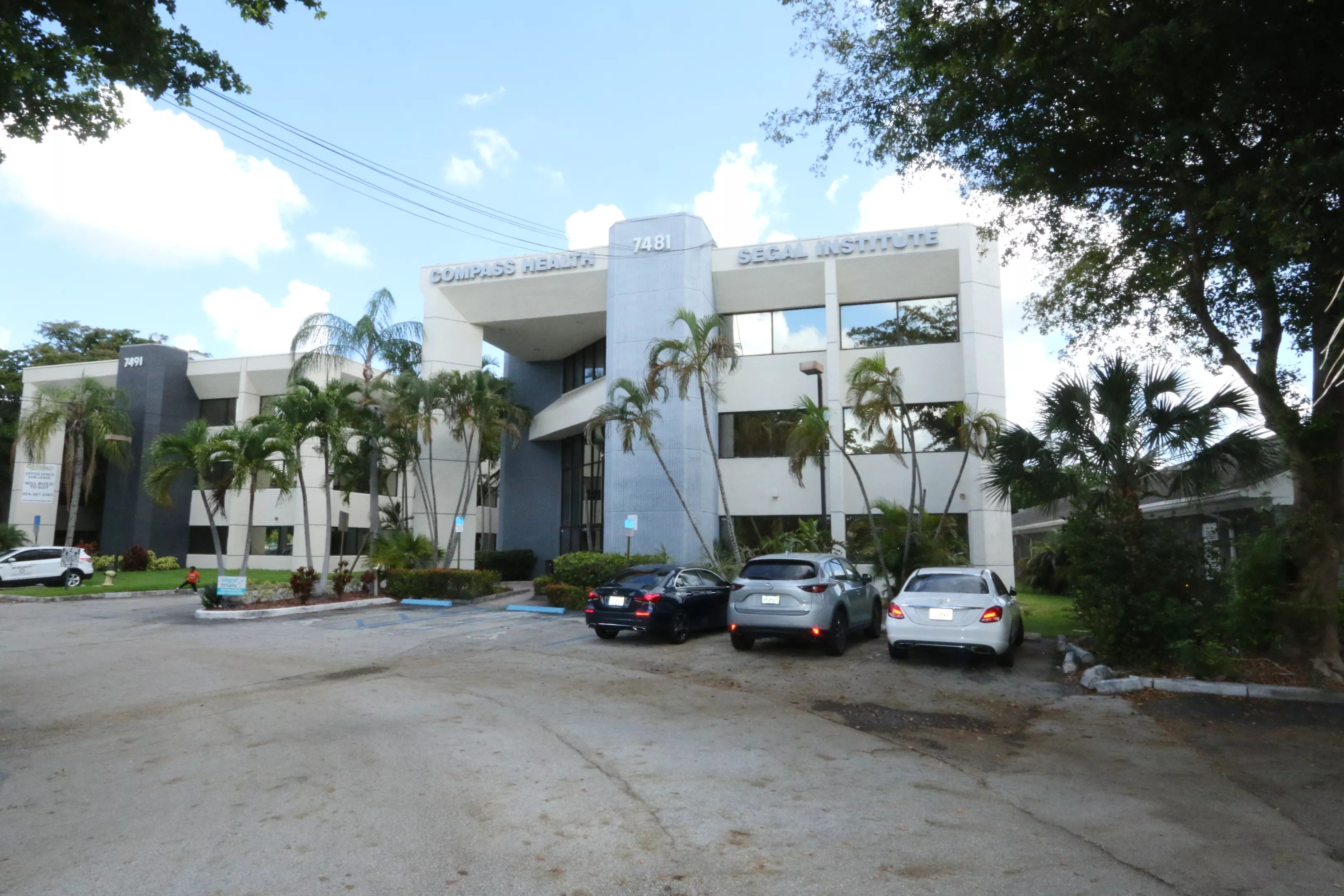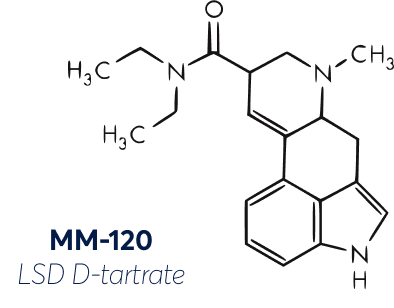
Photo by Theo Karantsalis

Audio By Carbonatix
Patients in the MM-120 clinical trial open the door to a nondescript Lauderhill medical facility off Oakland Park Boulevard and find themselves staring at a large seed-of-life symbol on the wall, which signifies unity and genesis in the world of sacred geometry.
A small sign underneath directs them to ascend one floor to Segal Trials’ Center for Psychedelic & Cannabis Research.
The center’s lobby has a 1970s living room vibe, and the scent of a narrow hallway lined with scenic art changes from hand sanitizer to sage as one approaches the “trip room.”
Here, patients will be transported – in the metaphysical sense, at least.
The place is one of about 20 sites around the country where New York-based biotech firm MindMed is testing out the potent hallucinogen LSD (lysergic acid diethylamide) to treat generalized anxiety disorder.
In the Phase II stage, the MindMed study is part of a recent resurgence of clinical trials in which various companies are testing psychedelic drugs such as LSD and psilocybin as treatments for psychiatric conditions ranging from post-traumatic stress disorder to depression. The compounds had spent decades in the shadows as stigmatized molecules shunned in the realm of psychiatric research.
“There is sometimes confusion about what we mean when we say ‘psychedelics,'” Dr. Scott Fisher, the lead facilitator and trainer at Segal’s Lauderhill site, tells New Times. “‘Psyche’ means mind or soul, and ‘delic’ means revealing or manifesting.”
“We don’t know what you are going to experience because what emerges, we think, is likely to be a very personal experience coming from the subconscious terrain of the mind,” Fisher says.
A Portal Opens in Lauderhill
If you are 18 to 74 years old, suffer from generalized anxiety disorder, and have no history of schizophrenia, bipolar disorder, or psychosis, you may qualify to take a heroic dose of LSD – in the name of science.
“You can be a hero and make medical history by joining one of our psychedelic clinical research trials,” Segal Trials’ website says.
At the Lauderhill site managed by Segal, patients receive a dose of either the LSD compound or a placebo and are monitored for the following ten to 12 hours and in the 12 weeks after treatment to see if their anxiety symptoms improve. According to the trial webpage, the study will test doses ranging from 25 micrograms to 200 micrograms for safety and effectiveness.
Segal Trials invited New Times to tour the facility, which includes the cozy trip room, complete with a stereo, headphones, a futon, and lots of pillows.
Fisher says patients wear eyeshades and headphones to avoid external sensory overload and take their journey inward. A scientifically sanctioned music playlist is preferred, but exceptions may be made on a case-by-case basis for transcendental music like Pink Floyd.
The setting is designed to help subconscious elements come into conscious focus. It’s akin to how a dim star at night appears from the side of one’s view, as peripheral vision has more rods for sensing low light. Researchers are hopeful that LSD may unlock the mind’s periphery, allowing patients to achieve a greater sense of self and break free from unhealthy mental states.

The site of Segal Trials’ Center for Psychedelic & Cannabis Research in Lauderhill, Florida.
Photo by Theo Karantsalis
Generalized anxiety disorder is characterized by persistent, excessive, and unrealistic worry about everyday things, including work and school, a condition that affects nearly seven million adults in the U.S., according to the National Institute of Mental Health.
Anxiety loops caused by the disorder are hard to break, and those who haven’t found their way out through typical antidepressant or antianxiety meds may find relief via a unique change of consciousness, Fisher says.
Single recreational doses of LSD in gel tabs or blotter paper traditionally have contained 20 to 100 micrograms of the compound. The larger the dose, the higher the risk of a user experiencing the dreaded bad trip, which can cause a cascade of anxiety and fear. Users’ mental state at the time of the trip, environmental factors, and attitudes of those around them contribute to whether the trip is positive.
Fisher says that few study participants have had a bad experience in the controlled clinical setting. He says some patients may experience an “emotional breakthrough” or feel like they are on a cathartic, mystical journey that imparts them a sense of unity with the universe and creation.
“They experience bliss, love, peace, joy, and laughter,” says Fisher, who recently attended a psychedelic conference in San Francisco.
Patients at the study site have included a symphony violinist, a cabinet maker, a pre-med student, and a stay-at-home mom.
Oddly, some participants who were given placebos have described psychedelic experiences, Fisher says.
Bending Brains Since ’38
LSD was first developed in 1938 by Swiss researcher Albert Hoffman, who famously took the mother of all acid doses on April 19, 1943, before he flew his bicycle home from the lab.
By the ’50s, LSD was used in CIA mind control experiments, like Project MK-Ultra, where the agency dosed unwitting participants in a sprawling, illegal operation.
The compound was popularized in part by Harvard professor Tim Leary in the 1960s and became a go-to drug for youth seeking to expand their minds. Stanford student Ken Kesey, author of the 1962 novel One Flew Over the Cuckoo’s Nest, drove cross country on an old school bus with his Merry Pranksters promoting the drug through “Acid Test” parties.
In the decades since, LSD research was stifled because of its Schedule I status under federal law, as designated by the 1970 Controlled Substances Act, which banned LSD for having “no currently accepted medical use.” The drug continued to be popular in recreational use, and underground proponents of the mind bender still celebrate “Bicycle Day” on April 19.
Funding and operational support for studies investigating psychedelic compounds as medical treatments ramped up again in the 2010s. Several early studies focused on psilocybin, an active ingredient in psychedelic mushrooms, were completed between 2010 and 2016, exploring the compound as a means of alleviating depression and alcohol addiction.

A diagram of the investigational LSD compound MM-120 by MindMed.
Graphic by MindMed
The psychedelic research revival reached a landmark in October 2022 as London-based Compass Pathways announced the first-ever Phase III clinical trial for psilocybin in psychiatric treatment. The study is investigating the compound’s efficacy in depression that is resistant to other medication.
Meanwhile, the Multidisciplinary Association for Psychedelic Studies (MAPS) is pursuing the first-ever Phase III trial on MDMA.
As for LSD research, MindMed is at the forefront, with the Phase II anxiety study underway, as well as a pending proof-of-concept study looking into the possibility of using low-dose LSD in adults with attention-deficit hyperactivity disorder.
MindMed was formed in 2019 by former Uber executive Jamon Rahn. In short order, it launched a 10-year exclusive collaboration with Swiss doctor Matthias Liechti, a researcher at University Hospital Basel in Switzerland, who has carried on Hoffman’s torch in the realm of psychedelic pharmacology. The deal gave MindMed the rights to several ongoing trials, including the Phase II anxiety study.
The “investigational product,” i.e., LSD, that patients may receive as part of the anxiety study has been dubbed “MM-120,” where MM stands for MindMed and “120” is just the numerical designation of the compound, according to a company executive.
“We won’t have an official brand name until we are closer to market,” MindMed vice president Maxim Jacobs tells New Times.